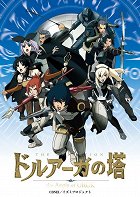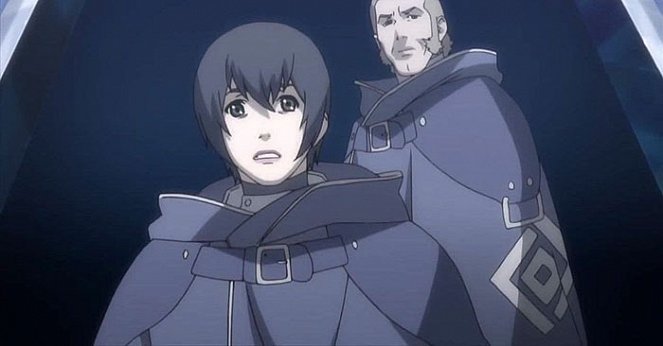Câmara:
Haruhide IshiguroMúsica:
Hitoshi SakimotoElenco:
Ken'ichirō Ōhashi, 須加みき, Tomomichi Nishimura, Daisuke Endō, Takahiro Sakurai, Yui Horie, Fumiko Orikasa, Akira Ishida, Ryûgo Saitô, Hozumi Gôda, Seirō Ogino (mais)Temporadas(2) / Episódios(24)
-
~the Aegis of URUK~ (2008) - 12 episódios
-
~the Sword of URUK~ (2009) - 12 episódios
Crítica desta série pelo utilizador Jeoffrey (2)
~the Aegis of URUK~ (2008) (S01)
The Tower of Druaga: The Aegis of Uruk is an immensely exciting and slightly above average fantasy adventure with slightly below average jokes, innuendo, and parodies. You cannot ignore the fact that it is an animated continuation of an old arcade game. When you find out about this, you suddenly find the part where the main male protagonist is literally controlled to replay the original Gilgamesh adventure, actually quite funny and well done. In other words, for fans of RPGs, D&D (just for those who know the adventures from old role-playing video games series like Might and Magic or Baldur's Gate), this will be familiar, i.e., it will hold almost no surprises for them. However, with its setting and atmosphere, it could be pretty entertaining. The main male protagonist makes visible progress (levels up) during each episode. Even though he is constantly told that he is nothing special, it is still clear to everyone that somehow he is going to make it, and what he cannot achieve with his abilities, and he will overcome through sheer determination. Of course, he also achieves this through cooperation with others, which is common in heroic anime series (like they have panties in ecchi that are way too skimpy). However, people will like it and it cannot hurt if it is done well (which is not the case in this anime series). As far as the other characters are concerned, there are quite a lot of them since it is basically a multi-group race. However, the anime's authors try to give us at least a minimal introduction to each player to outline their motivations. In other words, they try to help us relate to the characters so that we get upset when they die. Unfortunately, with how many characters there are and how much screen time they are given, it only affected me once anyway. Even though the deaths were always appropriately theatrical with an attempt to be as moving as possible (at one point, I was even reminded of the death of the knife expert Britt from The Magnificent Seven), I was hardly affected. I was just a bit sad only once. As far as the narrative is concerned, as the reviewer Subjektiv wrote, it is not convoluted, and it is more of a linear journey. Every now and again, we get undeniable indications that there is going to be a huge twist coming, which is going to take our breath away. However, that does not happen. Maybe it just comes across as a bit interesting, and someone like me will think that yes - I want to watch the next season because I want to know how it is going to turn out. However, being shocked, tense, looking forward - forget it! I thought this first part only deserved 6/10, but I am going to move on because the second half looks much better, according to the other reviews.
()
~the Sword of URUK~ (2009) (S02)
Was this season really better than the first? In many ways, yes, it was. For example, the characters are given much more screen time and show a much more comprehensive range of emotions and decision-making. This character development means the audience can get more into them, as they now have the necessary depth compared to the first season. It works out quite well because you might even find the commander of Gilgamesh's expeditionary force likable, and because of his acquaintance with a robot Lolita, he eventually achieves redemption and touches everyone's heart. Furthermore, the narrative is appropriately wrapped up, so the audience can feel the satisfaction they did not get in the first half. That is to say; you can finally experience the satisfaction of seeing a conclusion to wrap up the fates of the main protagonists. For the most part, it really does provide what someone like me wants for the characters. There is only one major exception that I can live with because of what happened in the first season. As far as the plot is concerned, it is a bit more convoluted than the first season; however, you could consider this an advantage because of the fact that I previously criticized how too straightforward it was. However, the honest truth is that I did not enjoy the "mish-mash" approach to this show that much. In the beginning, I found it still quite entertaining, and even in the third episode, I welcomed all the movie references (the countdown like in 24 Hours, the Star Wars-like Lando betrayal, and the Shawshank Redemption-like prison break plan). However, then the killer robots appeared, and I thought to myself that this just did not fit as well as the final confrontation with the goddess. I am certainly familiar with fantasy anime series where similar elements are present, like the Might and Magic role-playing video games series I mentioned in the review of the previous season (because for example in MaM VI, we find out that one of the pyramids is concealing a spaceship...). However, I am not always into that combination, and here it struck me as rather odd and out of place. Likewise, the whole main plotline concerning what the Tower of Druaga represents and its connection to the facts, the gods, and the individual characters was probably meant to surprise me, floor me, and keep me interested; I do not know. However, I simply remained calm, like, "well, OK". Back to the beginning and the question - is it better than the first season? To sum it up, the answer is yes, even though I immediately have to ask a second question - did I enjoy it more than the first season? Well, the fact is that yes, I indeed did, just not that much. 6.4/10.
()

